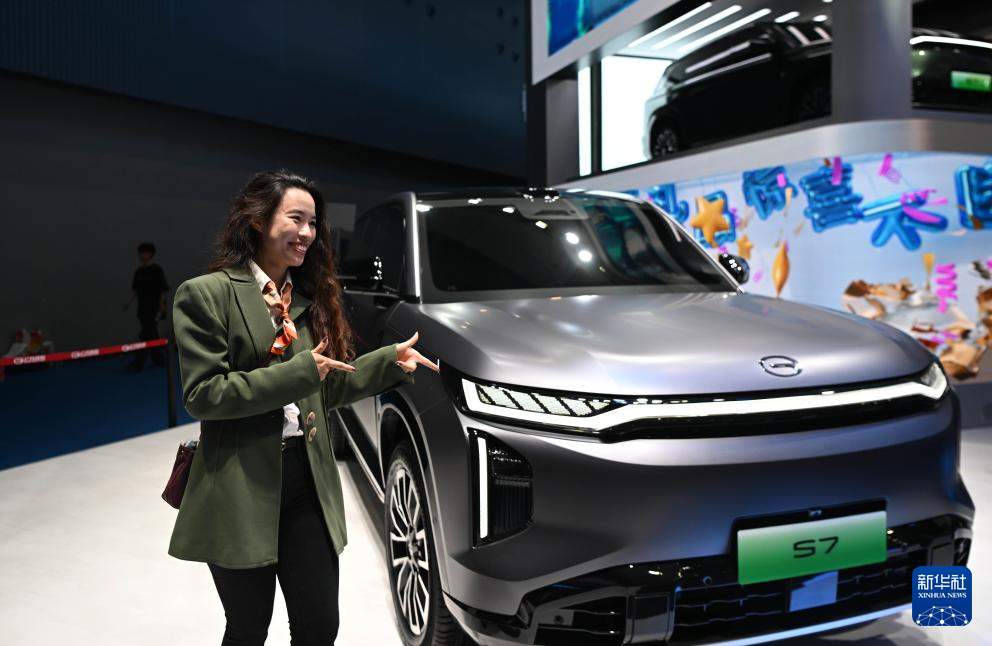




- BRNN
- BRI News
- BRNN News
- Database
Official Documents Polices and Regulations
Inter-government Documents International Cooperation BRI Countries
Business Guide Economic Data BRI Data
Trade
Investment Projects Latest projects
Cases - Content Pool
A wave of eco-friendly consumption is sweeping across China's young people. From favoring sustainable brands to buying energy-efficient products and preferring new energy vehicles (NEVs), the theme of "green" has emerged as one of the key trends in youth consumption.
According to online surveys, young consumers are increasingly willing to pay for sustainable brands and products, and more than half of the respondents consume on second-hand platforms. This demonstrates their environmental consciousness and savvy spending habits.
Chen Jian, a consumer born in the 1990s, recently purchased a smart air conditioner at a home appliance store in southwest China's Chongqing Municipality.
"While it costs more than standard models, the trade-in subsidies make it a good deal, and most importantly, it's energy-efficient," Chen said. His new unit, equipped with an artificial intelligence chip, can reduce annual electricity consumption by over 10 percent by automatically adjusting to indoor and outdoor temperature differences.
China's consumer goods trade-in policy has spurred the sales of automobiles, appliances and home furnishings, among which energy-saving products are in high demand.
Since August 2024, when a new round of trade-in subsidies for home appliances kicked in, the sales of energy-efficient washer-dryers, smart air conditioners, and built-in combi steamers surged by 129 percent, 135 percent, and 228 percent respectively on Chinese e-commerce platform Suning.com.

A woman poses for a photo beside a new energy vehicle during an auto show in Guangzhou, south China's Guangdong Province, Nov. 15, 2024. (Xinhua/Deng Hua)
In the auto sector, the high cost-performance ratio of NEVs has made them the top choice for many young buyers.
"Compared to traditional cars, NEVs are energy-saving and eco-friendly. They're also packed with smart features, which are super attractive," said Wang Li, a post-90s consumer, at a NEV booth in a shopping mall in Chaoyang district, Beijing.
China's NEV annual output and sales each exceeded 10 million units for the first time in 2024, with sales accounting for 40.9 percent of total new car sales.
Online surveys indicate that consumers born in the 1980s and 1990s make up a larger share of potential NEV buyers.
In addition, China's second-hand vehicle market recorded steady growth in 2024, with annual transactions growing 6.52 percent year on year to over 19.61 million units. More and more young people are choosing to trade in old vehicles for new ones.
Vehicles aren't the only good consumers are willing to shop second-hand markets for. Nowadays, an increasing number of young people are turning to second-hand goods trading platforms to sell unused items and make some extra cash, while also hunting for hidden gems on the platform.
According to data from Xianyu, one of China's largest second-hand goods trading platforms, its registered users have surpassed 600 million, with an average daily transaction volume exceeding 1 billion yuan (about $137.86 million). Over 100 million users listed their idle items on the platform in a year. Notably, more than half the platform's users are born after 1995 and 2000.
"It's not about being unable to afford new items - second-hand goods often offer a higher cost-performance ratio," said Hu Yuxing, 24, a newcomer to Hangzhou in east China's Zhejiang Province, who regularly shops for everything from second-hand clothes to cosmetics.
Beyond online transactions, brick-and-mortar second-hand stores are also emerging as trendy shopping destinations for young people.
"For young people, buying and selling second-hand items reflects their eco-conscious and rational consumption habits. It has become a lifestyle for them," said Li Shijie, head of Xianyu's offline operations.
Li added that the platform aims to connect more idle resources, refine the circulation network for second-hand goods, and help promote a new trend of green consumption.
The green mindset extends to dining habits, with food delivery platforms offering more dishes in smaller and half sizes, meeting the consumption needs of young people.
Young consumers are also embracing reusable containers and recycling programs. Bringing their own cups for coffee purchases not only reduces the waste of paper cups but can save nearly 100 yuan monthly. The green consumption concept is now infiltrating into every part of young Chinese consumers.
An official from the Ministry of Commerce said promoting green development and encouraging green consumption are crucial for China to achieve carbon peak and carbon neutrality goals, build a new development paradigm, and advance high-quality development.
The official added that the ministry will launch a series of activities to promote green consumption, aiming to further unlock the potential of green consumption.

Tel:86-10-65363107, 86-10-65368220, 86-10-65363106